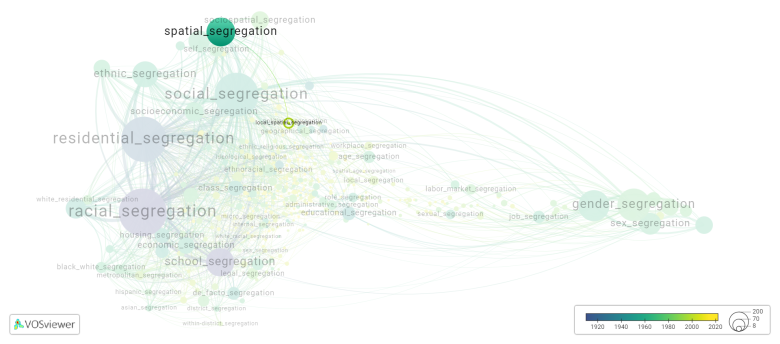Local spatial segregation: Difference between revisions
(Creating page) |
(Creating page) |
||
| (7 intermediate revisions by the same user not shown) | |||
| Line 1: | Line 1: | ||
===== Date and country of first publication<ref>Date and country of first publication as informed by the Scopus database (December 2023).</ref>===== | |||
2007<br> | 2007<br> | ||
New Zealand | New Zealand | ||
===== Definition ===== | |||
Local spatial segregation refers to the separation of people from different backgrounds or social groups within a specific geographical area. It occurs when certain groups concentrate in specific neighborhoods or areas, resulting in limited interaction and exchange between individuals from different backgrounds. This segregation often leads to differences in socioeconomic status, access to resources, and opportunities between different areas within a city or region. Local spatial segregation can be influenced by factors such as income disparities, racial or ethnic discrimination, and housing policies. | Local spatial segregation refers to the separation of people from different backgrounds or social groups within a specific geographical area. It occurs when certain groups concentrate in specific neighborhoods or areas, resulting in limited interaction and exchange between individuals from different backgrounds. This segregation often leads to differences in socioeconomic status, access to resources, and opportunities between different areas within a city or region. Local spatial segregation can be influenced by factors such as income disparities, racial or ethnic discrimination, and housing policies. | ||
==See also== | ==See also== | ||
==Related segregation forms== | |||
Local spatial segregation is frequently discussed in the literature with the following segregation forms: | |||
[[spatial segregation]], [[residential segregation]], [[social segregation]], [[local segregation]] | |||
[[File:local_spatial_segregation.png|780x780px]] | |||
This visualization is based on the study [[Segregation_Wiki:About| The Multidisciplinary Landscape of Segregation Research]]. | |||
For the complete network of interrelated segregation forms, please refer to: | |||
* [https://tinyurl.com/2235lkhw First year of publication] | |||
* [https://tinyurl.com/2d8wg5n3 Louvain clusters] | |||
* [https://tinyurl.com/223udk5r Betweenness centrality] | |||
* [https://tinyurl.com/244d8unz Disciplines in which segregation forms first emerged (Scopus database).] | |||
==References== | ==References== | ||
==Notes== | ==Notes== | ||
<references /> | <references /> | ||
{{NoteAI}} | {{NoteAI}} | ||
== | ==Local spatial segregation appears in the following literature== | ||
O'sullivan D., Wong D.W.S. (2007). A surface based approach to measuring spatial segregation. ''Geographical Analysis'', ''39''(2), 147-168. https://doi.org/10.1111/j.1538-4632.2007.00699.x | |||
Folch D.C., Rey S.J. (2016). The centralization index: A measure of local spatial segregation. ''Papers in Regional Science'', ''95''(3), 555-576. Blackwell Publishing Ltd.https://doi.org/10.1111/pirs.12145 | |||
Latest revision as of 07:17, 16 October 2024
Date and country of first publication[1][edit | edit source]
2007
New Zealand
Definition[edit | edit source]
Local spatial segregation refers to the separation of people from different backgrounds or social groups within a specific geographical area. It occurs when certain groups concentrate in specific neighborhoods or areas, resulting in limited interaction and exchange between individuals from different backgrounds. This segregation often leads to differences in socioeconomic status, access to resources, and opportunities between different areas within a city or region. Local spatial segregation can be influenced by factors such as income disparities, racial or ethnic discrimination, and housing policies.
See also[edit | edit source]
Related segregation forms[edit | edit source]
Local spatial segregation is frequently discussed in the literature with the following segregation forms:
spatial segregation, residential segregation, social segregation, local segregation

This visualization is based on the study The Multidisciplinary Landscape of Segregation Research.
For the complete network of interrelated segregation forms, please refer to:
References[edit | edit source]
Notes[edit | edit source]
- ↑ Date and country of first publication as informed by the Scopus database (December 2023).
At its current state, this definition has been generated by a Large Language Model (LLM) so far without review by an independent researcher or a member of the curating team of segregation experts that keep the Segregation Wiki online. While we strive for accuracy, we cannot guarantee its reliability, completeness and timeliness. Please use this content with caution and verify information as needed. Also, feel free to improve on the definition as you see fit, including the use of references and other informational resources. We value your input in enhancing the quality and accuracy of the definitions of segregation forms collectively offered in the Segregation Wiki ©.
Local spatial segregation appears in the following literature[edit | edit source]
O'sullivan D., Wong D.W.S. (2007). A surface based approach to measuring spatial segregation. Geographical Analysis, 39(2), 147-168. https://doi.org/10.1111/j.1538-4632.2007.00699.x
Folch D.C., Rey S.J. (2016). The centralization index: A measure of local spatial segregation. Papers in Regional Science, 95(3), 555-576. Blackwell Publishing Ltd.https://doi.org/10.1111/pirs.12145
